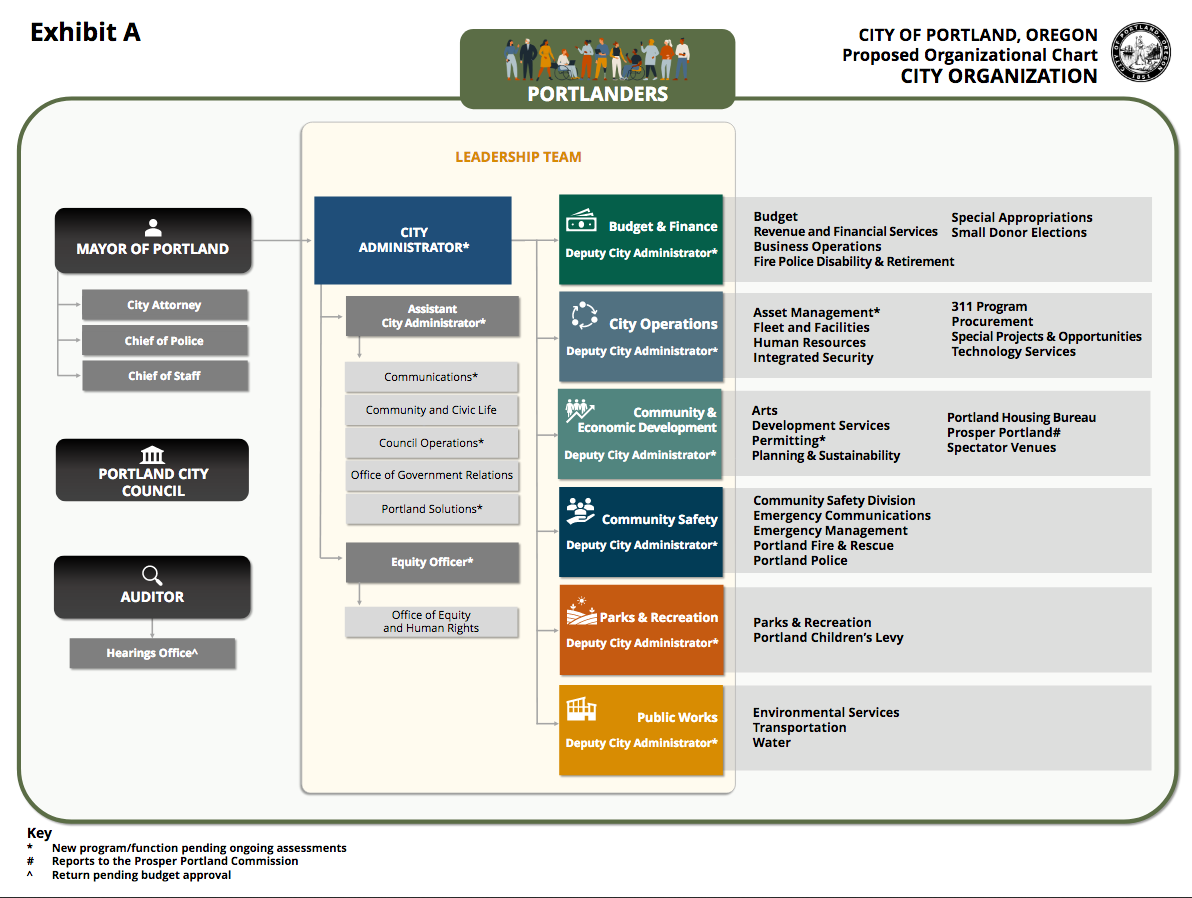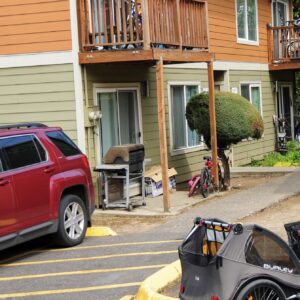
Two upcoming votes — about the City of Portland’s future org chart and a slew of amendments that roll back certain housing regulations — will have broad impacts on Portland development and governance. Here’s the lowdown:
Probably no bureau has been more battered by the inefficiencies of Portland’s antiquated commissioner form of government than the Bureau of Development Services (BDS). The bureau is charged with coordinating the review of building permits across several other permitting bureaus: Environmental Services, Transportation, Water, Forestry, Fire.
City audits going as far back as the 1980s have repeatedly pointed out that BDS is responsible for herding cats across multiple bureaus and commissioners—without having authority over any of them. This disorganization has led to developers complaining for years about delayed applications, inconsistency, unresponsive service and lack of accountability. By 2021, city auditors were blunt about the situation:
The commission form of government and fragmented permitting authority across seven bureaus has resulted in no one entity empowered to resolve these long-standing Citywide problems. This is exacerbated by leadership turnover – both with bureau directors and Commissioner assignments – that results in changed priorities, focus areas, and funding decisions. As a result, each bureau director and their Commissioner-in-charge remains focused on their own bureau and not on the City permitting process as a whole.
It’s been a long time coming, but the development review process — and Portland — may finally be getting the reorganization they need thanks to charter reform. Last week, The City of Portland Charter Transition Team released their final draft proposal for the City’s organizational structure, and this morning the City Council is holding a Charter Transition Work Session to go through it.
Tomorrow, November 1st, Council votes on the reorganization of city bureaucracy.
Here’s my question: Given that the development review process has underperformed for 40 years because of Portland’s commission form of government, how much are local building regulations responsible for our housing supply crisis?
I ask because another vote happening soon is the November 14 Planning Commission’s vote to forward Housing Regulatory Relief amendments to the City Council for a December decision about eliminating or temporarily suspending 16 different building regulations, including rules about bike parking. This is being done in an effort close the big gap between the current rate of housing production and the city’s projected needs.
But consider the possibility that the charter reform changes to city government, specifically how they will affect BDS, might more successfully increase housing production than the regulatory rollbacks being contemplated.
I’ve read many of the city reports on these issues. I’m not close to being an expert, but I’m reasonably informed. I still haven’t been convinced, however, that regulation is a big driver of our housing shortage, or that lessening the regulations will result in more shelter being built.
Depending on the outcomes, Portland might be closer to walking back some of its most innovative building regulations, even though its new governance structure might provide a stronger solution to building more housing.
Correction: The post initially reported that the Planning Commission vote on the Housing Regulatory Relief was on November 1st. That is incorrect. The vote will be held on November 14. We apologize for the confusion.
Update, October 31: The Planning Commission has scheduled a 2nd session on Housing Regulatory Relief for November 7th, “to more thoughtfully and deliberately consider the proposals and public feedback.” The work session will be held virtually and broadcast live (and available after the meeting) via YouTube.








Thanks for reading.
BikePortland has served this community with independent community journalism since 2005. We rely on subscriptions from readers like you to survive. Your financial support is vital in keeping this valuable resource alive and well.
Please subscribe today to strengthen and expand our work.
I’m pretty sure city council will vote to give developers whatever they want, thereby selling out future generations of Portlanders who will not have clean water, safe streets (for anyone outside of a car), or walkable neighborhoods.
Gotta give the developers some kudos, however, for knowing exactly when and how to play the politicians like a big old cello.
Yep the far left Portland progressives are really sucking up to the developers right now. Carmen Rubio and crew seem more than willing to throw out carefully crafted environmental regulations. Yet except for the Willamette Riverkeepers it’s seems those who profess love for the environment in Portland are silent……
I’ve always wondered why it’s throw out the environmental regulations and not a moratorium on inspection fees, development fees, and all the other misc fees the various city bureaus tack on? The Mayor and City Council are masters of finding money in the couch cushions for their pet projects, maybe they could find some that pays for the bureau staff without having to collect fees from developers?
Of course I’m always agast at the useless inspectors and the ridiculous fees we pay. Couple years ago had an inspector out, he took 60 seconds to look at the work, and then was gone. Yeah, I felt so overly confident at the inspection that was done and thought I really got my moneys worth.
I know there’s no easy answers to help with housing, but maybe try a bunch of little things will add up to something better.
Here’s the zoning map of Portland. Look at the yellow. One large variable in the cost of developing new housing is the available land or supply. Ladds, Irvington, Laurelhurst are all close-in neighborhoods zoned R5. Maintaining that low level of density is extremely expensive. The belief that we can both live in suburban style housing close to the city center, and keep housing cheap is something we’re still struggling with as a culture.
And there was very little multi-unit housing production in areas that were already zoned for plexes and apartment building (e.g. the old R1, R2, and R3 zones). Perhaps the issue is not so much regulations but a highly-speculative housing system that is fanatically driven by the pursuit of ever-higher margin and reduced investor risk.
.
The belief that real estate investors will address the housing crisis by overbuilding and cratering their profits to the point of bankruptcy is lunacy. The only path to a just housing system that is not in permanent crisis is massive production of non-market housing (preferably 10+ stories).
This has to be accompanied by long-term funding guarantees that won’t leave people trapped in a high-rise housing hellhole, as has happened multiple times in the past as funding for maintenance and upkeep gets cut.
Otherwise, public housing becomes its own permanent crisis.
Ladds should be way more dense than it is. We need a Ladds multiplication.
Ladds exponentiation
It surprises me that Rubio is behind this. I thought of her as an environmentally oriented candidate. It turns out the call was coming from inside the house.
Sadly, these rollbacks will not produce more housing, especially when interest rates are at (recent) historic highs. But they will have a permanent effect on what does get built.
Classic short term thinking.
Nice piece, as always, Lisa.
I clicked the link to the org charts, which are substantial works of art. The third seems to be the crucial one, as it details relationship of the twelve councilors to the “bureaucracy.”
Each councilor has a “Senior Council Aide” and a simple “Council Aide.” Adjacent to the twelve and their Aides and within extensive dashed lines are five free floating “Administrative Specialists,” one of which anchors four other positions, two “Analysts” and two “Coordinators,” each further designated by Roman numerals.
“City Administrator” also floats within the dashed lines, connected by a solid line to “Shared Council Staff Director (Manager II).” This last personage is connected to the general area occupied by the twelve “councilors” and their “Aides” by other dashed lines.
So very elegant!
I suspect that all the “Aides,” “Administrators,” “Analysts,” “Coordinators,” “Director-Manager,” with or without Roman numerals, will strive to amass as much personal power as they can, and so end up running the show.
Pretty much the way things work now.
Now we have elected officials running their own kingdoms. Soon we’ll have unelected appointees running those same kingdoms.
Meet the new boss, same as the old boss.
I have been telling people for quite some time, and amazingly get met with disbelief despite the evidence: Wheeler and other developer allies have been nailing down the furniture so the new tenants can’t move it around when they arrive. Lisa is correct – the new city government might just make these giveawa – er, rollbacks, unnecessary… so they’ve got to get them in place now.
Note that i said ‘developer allies’ and not ‘development;’ I am for increased density but I am not for throwing out rules that help make the future a livable one.
An appointed city administrator, an assistant city administrator and six deputy city administrators, plus a separate chief of staff, chief of police, and city attorney controlled by the mayor, a total of 11, plus numerous extra staff, replacing 5 elected city administrators (the mayor and the four city commissioners) is not going to be “more efficient” – if anything, it’s going to be less transparent and more bureaucratic. You’ll hate it in no time, trust me. All 11 administrators should be under the City Council – any that the mayor retains will effectively nullify all your hard-fought changes and you’ll be back to where you started from.
The deputy city administrator in charge of public works (water, BES, & PBOT) will have over 60% of the city budget – good luck with that.
Does this mean that the city might start fixing streets, instead of spending endless years arguing over which bureau is responsible?
It might, but nope.
Building costs in some areas rose 24% last year, with projections of 14% annual increases, which continue to far outpace wage increases. Its just economics that this will result in a continued rise in the humanitarian catastrophe of economic refugees being forced from housing to the streets.
As in most cases, the most effective approach is a holistic one that combines many small contributions and distributes the pain over multiple special interests. Building codes created decades ago when housing was plentiful took into account the cost-benefit tradeoff that existed at that point in time. It is entirely appropriate to re-evaluate regulatory cost-benefit when conditions change drastically and when we are looking at a humanitarian crisis. Such cost-benefit analysis should put human rights first and consider the overall impact picture. Any evaluation of a building’s environmental impacts should factor in the impacts of having less affordable housing by factoring in the environmental impacts of having increased numbers of people living outdoors. Due to ever-increasing restrictions on the public spaces that homeless are allowed to occupy/hide, they are being pushed more into surrounding sensitive natural areas where they can experience fewer complaints from residents. I personally witnessed an eddy in a creek in a wooded natural area, downstream from a camp, that had collected a wide variety of hazardous waste so thick that you could no longer see the water surface.
Keep in mind that a tent conforms to zero codes. There should be room for a third code set option, a less bloated one that could apply to buildings with more affordable housing units. Underrepresented in the conversation may be the voices of those who are working three jobs to try and stay housed and don’t have the time or energy to attend the city meetings. Input from those at risk of losing housing should be sought out to see if they would prefer housing built with a more cost-effective code set or else a tent on the sidewalk. I’m not getting the impression that those voices were well represented.
This premise puts a lot of faith in a new government that doesn’t yet exist, hasn’t really been implemented before, and more than doubles the number of cooks in the legislative kitchen.
So long as we’re accepting an anything-else charter reform, it seems like we could allow more creativity in housing. Policy has given us a de facto prescriptive style of new housing we’ve gotten in the past decade. We get bland buildings with silly names on the outside, then four half-empty floors of apartments over a ground floor with vacant retail space, a pet wash station, and a room where your bike gets stolen. If you’re attached to any of that, tag yourself as a fan: I’ll wait.
Here’s a concrete example for you (from Bend): A friend of mine owns a duplex with a back yard big enough for another duplex. He wanted to subdivide the lot, so he could build another duplex, and densify the neighborhood. He would have created two two-bedroom housing units at, say $1500 a month, in a neighborhood where similar-sized single family dwellings rent for $2000+. The City said fine, as long as you build new sidewalks, curbs, and pay SDC’s. Total for his sub-divide BEFORE breaking ground on the duplex….$100,000 AND when he did build his new duplex, he would have to cut out driveways in two locations to access the rear of the duplex, but only after completing the sub-divide True story He penciled it out and just sold the duplex as is. Now, Bend plan approvers and inspectors are notorious for incompetence and changing their mind, but his one took the cake.